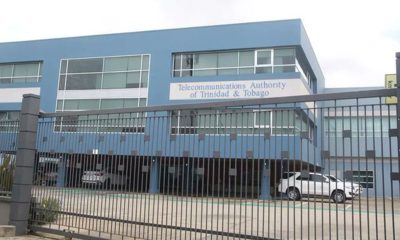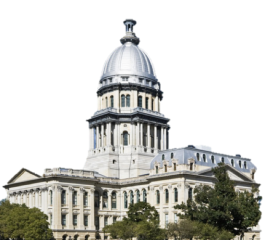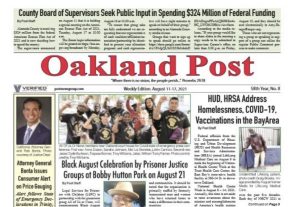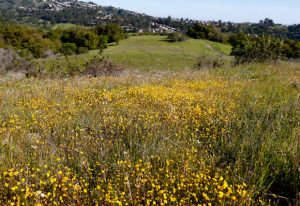National
Beyond Survival: Life After Rape
By Jazelle Hunt
Washington Correspondent
LAST IN A SERIES
WASHINGTON (NNPA) – “On May 15, 1995, two men ran up behind me as I approached my apartment building, and one of them pointed a gun at my head. In the hour that followed, I was blindfolded, gagged, tied facedown to my bed, and raped by both.”
Eight years after that horror, Lori Robinson published those words as an introduction to her guidebook for Black survivors and their loved ones, titled I Will Survive: The African American Guide to Healing from Sexual Assault and Abuse.
Since then, Lori, who moved from Washington, D.C. to Detroit, has enjoyed a fulfilling, happy life. But on that night 20 years ago, she didn’t know how, or if, she would recover.
“I remember asking if, after such assault, women went on to have normal lives, get married, have children, be happy,” she writes in I Will Survive. “It sounds silly to me now, but on May 15, 1995, I found it inconceivable that someone could be normal, much less happy after experiencing what I had.”
Silence and other hurdles to healing
The circumstances around Lori’s assault were atypical – there was more than one assailant, they were strangers, and there was a weapon involved. In more common circumstances – when the people know each other or are related; when alcohol is involved or there has been previous sexual/romantic involvement; when the perpetrator is a prominent figure; or when the survivor was became pregnant – the decision to report a rape can be even more agonizing.
“I respect whatever anyone’s choice is about whether or not to disclose, because everyone’s doing the best that they can, at the time, with the information they have. And not everyone is in an environment where they get good information and support,” Robinson stated.
“There’s still too much silence, but it’s not the fault of the survivors. It’s because we as a community, as individuals, as a society, haven’t done what we need to do to make disclosure a safe and preferable choice for anyone who experiences sexual assault.”
“…A gradual process”
The men who raped Lori had stolen her car, electronics, and her landline cord. After carefully freeing herself from her bed, she mustered the courage to knock on a neighbor’s door so she could call the police.
After the police she called her sister, who picked her up and took her back to her home. The following day, she called the DC Rape Crisis Center hotline. Later, her mother and sister accompanied her to her first counseling session. That evening, Lori told her boyfriend and the next day he accompanied her to counseling, the first of several occasions.
Her memory is a blur after that first week.
“For like a good year after I was raped – I don’t have many specific memories from that year. It’s very fuzzy,” she says. “[Healing] was a gradual process – it wasn’t like I finished therapy and it was over.”
A journalist, Lori slowly channeled her pain into her work. About a year-and-a-half after the assault, she agreed to write an article on a freshman Spelman College student who maintained that four Morehouse College students – three of whom were on the basketball team – had gang raped her. Spelman was Lori’s alma mater; her own rape occurred the same week as her 5-year class reunion.
The article, “Rape of a Spelman Coed” was published in Emerge magazine almost exactly two years after Lori’s assault. It became an award-winning story, and the springboard for I Will Survive.
“After that article, [the magazine] got a really powerful response,” she recalled. “So the idea [for the book] came from having written an article about sexual assault; realizing that this was a huge problem in the African American community; that we didn’t have culturally specific resources available to us; and that we just didn’t know how to deal with sexual assault.”
From surviving to thriving
To her knowledge, Robinson’s assailants were never caught and are thought to be responsible for at least three other rapes. Still, in 1996 she marked the one-year anniversary of her survival with a celebration.
“I’d experienced the most horrific thing I could possibly imagine, and I am still standing. I am still going to work; I still have my right mind, for the most part. It absolutely was a celebration of my survival,” she remembers.
Today, she has become a noted activist and speaker on the issue of sexual assault, speaking at more than 100 events in more than 20 states and in three countries. She has lived and taught in Ecuador, Brazil, and other parts of Latin America, and is still enjoying a career as an award-winning bilingual journalist and educator.
She also married Ollie Johnson, the boyfriend who had been there with her through it all.
“We weren’t married then, but I definitely thought of us as a couple. You come together, you support, you love, you struggle, you handle it, you get through it. That was my mental-emotional framework,” he said.
“I’ve had various crises and challenges with my own family, but nothing like what happened to Lori. So I didn’t have any direct experience with supporting or helping or loving survivors. But I just kind of knew that was the right thing to do.”
When Robinson first began writing I Will Survive, Ollie thought it was a great idea and logical next step from the Emerge article – until it became clear that the research, interviewing, and writing caused Robinson to relive her trauma.
“I recommended that she consider dropping it or suspending it on several occasions, because it was so painful…. She would always say that she had to do it. And she worked through it,” he said. “I was very impressed with her strength and resilience through the whole process and still am just amazed that she could handle everything the way she’s handled it.”
Robinson encourages survivors to seek healing, whatever that may mean for them.
“Not every survivor necessarily needs therapy, but based on my personal experience, I highly recommend that survivors reach out to someone. It’s so important to be able to tell your story, let it out, [to] be able to talk to someone who can empathize with you, support you, and encourage you,” she said.
“Take care of yourself. Think of mental, physical, emotional, and spiritual self-care. What feels nourishing to you? What feels safe to you? What makes your body feel good? Do that.”
.Every survivor’s experience is profoundly personal. At the same time, millions of survivors are all fighting through the same devastation of this rampant trauma, often in shame and silence.
Robinson wants them all to remember one thing “What happened to you is not your fault. No matter what the circumstances were – no matter what you wore, or what you drank, or what time it was, or where you were – the only person who was responsible, the person who deserves all of the blame, is the person who forced unwanted sexual activity on you,” she said. “You are no less perfect, or sacred, or beautiful because of what happened to you.”
PART I: Rape and the Myth of the ‘Strong Black Woman’
PART III: Some Faith Leaders Victimize Survivors Again
PART IV: The Loud Silence of Rape Survivors
(The project was made possible by a grant from the National Health Journalism Fellowship, a program of the University of Southern California Annenberg School for Communication and Journalism.)
###
Barbara Lee
Congresswoman Barbara Lee Issues Statement on Deaths of Humanitarian Aid Volunteers in Gaza
On April 2, a day after an Israeli airstrike erroneously killed seven employees of World Central Kitchen (WCK), a humanitarian organization delivering aid in the Gaza Strip, a statement was release by Rep. Barbara Lee (D-CA-12). “This is a devastating and avoidable tragedy. My prayers go to the families and loved ones of the selfless members of the World Central Kitchen team whose lives were lost,” said Lee.

By California Black Media
On April 2, a day after an Israeli airstrike erroneously killed seven employees of World Central Kitchen (WCK), a humanitarian organization delivering aid in the Gaza Strip, a statement was release by Rep. Barbara Lee (D-CA-12).
“This is a devastating and avoidable tragedy. My prayers go to the families and loved ones of the selfless members of the World Central Kitchen team whose lives were lost,” said Lee.
The same day, it was confirmed by the organization that the humanitarian aid volunteers were killed in a strike carried out by Israel Defense Forces (IDF). Prior to the incident, members of the team had been travelling in two armored vehicles marked with the WCF logo and they had been coordinating their movements with the IDF. The group had successfully delivered 10 tons of humanitarian food in a deconflicted zone when its convoy was struck.
“This is not only an attack against WCK. This is an attack on humanitarian organizations showing up in the direst situations where food is being used as a weapon of war. This is unforgivable,” said Erin Gore, chief executive officer of World Central Kitchen.
The seven victims included a U.S. citizen as well as others from Australia, Poland, the United Kingdom, Canada, and Palestine.
Lee has been a vocal advocate for a ceasefire in Gaza and has supported actions by President Joe Biden to airdrop humanitarian aid in the area.
“Far too many civilians have lost their lives as a result of Benjamin Netanyahu’s reprehensible military offensive. The U.S. must join with our allies and demand an immediate, permanent ceasefire – it’s long overdue,” Lee said.
Commentary
Commentary: Republican Votes Are Threatening American Democracy
In many ways, it was great that the Iowa Caucuses were on the same day as Martin Luther King Jr. Day. We needed to know the blunt truth. The takeaway message after the Iowa Caucuses where Donald Trump finished more than 30 points in front of Florida Gov. De Santis and former South Carolina Governor Nikki Haley boils down to this: Our democracy is threatened, for real.

By Emil Guillermo
In many ways, it was great that the Iowa Caucuses were on the same day as Martin Luther King Jr. Day.
We needed to know the blunt truth.
The takeaway message after the Iowa Caucuses where Donald Trump finished more than 30 points in front of Florida Gov. De Santis and former South Carolina Governor Nikki Haley boils down to this: Our democracy is threatened, for real.
And to save it will require all hands on deck.
It was strange for Iowans to caucus on MLK day. It had a self-cancelling effect. The day that honored America’s civil rights and anti-discrimination hero was negated by evening.
That’s when one of the least diverse states in the nation let the world know that white Americans absolutely love Donald Trump. No ifs, ands or buts.
No man is above the law? To the majority of his supporters, it seems Trump is.
It’s an anti-democracy loyalty that has spread like a political virus.
No matter what he does, Trump’s their guy. Trump received 51% of caucus-goers votes to beat Florida Gov. Ron DeSantis, who garnered 21.2%, and former South Carolina Gov. Nikki Haley, who got 19.1%.
The Asian flash in the pan Vivek Ramaswamy finished way behind and dropped out. Perhaps to get in the VP line. Don’t count on it.
According to CNN’s entrance polls, when caucus-goers were asked if they were a part of the “MAGA movement,” nearly half — 46% — said yes. More revealing: “Do you think Biden legitimately won in 2020?”
Only 29% said “yes.”
That means an overwhelming 66% said “no,” thus showing the deep roots in Iowa of the “Big Lie,” the belief in a falsehood that Trump was a victim of election theft.
Even more revealing and posing a direct threat to our democracy was the question of whether Trump was fit for the presidency, even if convicted of a crime.
Sixty-five percent said “yes.”
Who says that about anyone of color indicted on 91 criminal felony counts?
Would a BIPOC executive found liable for business fraud in civil court be given a pass?
How about a BIPOC person found liable for sexual assault?
Iowans have debased the phrase, “no man is above the law.” It’s a mindset that would vote in an American dictatorship.
Compare Iowa with voters in Asia last weekend. Taiwan rejected threats from authoritarian Beijing and elected pro-democracy Taiwanese vice president Lai Ching-te as its new president.
Meanwhile, in our country, which supposedly knows a thing or two about democracy, the Iowa caucuses show how Americans feel about authoritarianism.
Some Americans actually like it even more than the Constitution allows.
About the Author
Emil Guillermo is a journalist and commentator. He does a mini-talk show on YouTube.com/@emilamok1.
Activism
Oakland Post: Week of April 10 – 16, 2024
The printed Weekly Edition of the Oakland Post: Week of April 10 – 16, 2024

To enlarge your view of this issue, use the slider, magnifying glass icon or full page icon in the lower right corner of the browser window. ![]()
-

 Activism4 weeks ago
Activism4 weeks agoOakland Post: Week of March 20 – 26, 2024
-

 #NNPA BlackPress3 weeks ago
#NNPA BlackPress3 weeks agoCOMMENTARY: D.C. Crime Bill Fails to Address Root Causes of Violence and Incarceration
-

 #NNPA BlackPress3 weeks ago
#NNPA BlackPress3 weeks agoMayor, City Council President React to May 31 Closing of Birmingham-Southern College
-

 #NNPA BlackPress3 weeks ago
#NNPA BlackPress3 weeks agoFrom Raids to Revelations: The Dark Turn in Sean ‘Diddy’ Combs’ Saga
-

 #NNPA BlackPress3 weeks ago
#NNPA BlackPress3 weeks agoCOMMENTARY: Lady Day and The Lights!
-

 #NNPA BlackPress3 weeks ago
#NNPA BlackPress3 weeks agoBaltimore Key Bridge Catastrophe: A City’s Heartbreak and a Nation’s Alarm
-

 #NNPA BlackPress3 weeks ago
#NNPA BlackPress3 weeks agoBaltimore’s Key Bridge Struck by Ship, Collapses into Water
-

 Activism3 weeks ago
Activism3 weeks agoOakland Post: Week of March 27 – April 2, 2024
National
Beyond Survival: Life After Rape
By Jazelle Hunt
Washington Correspondent
LAST IN A SERIES
WASHINGTON (NNPA) – “On May 15, 1995, two men ran up behind me as I approached my apartment building, and one of them pointed a gun at my head. In the hour that followed, I was blindfolded, gagged, tied facedown to my bed, and raped by both.”
Eight years after that horror, Lori Robinson published those words as an introduction to her guidebook for Black survivors and their loved ones, titled I Will Survive: The African American Guide to Healing from Sexual Assault and Abuse.
Since then, Lori, who moved from Washington, D.C. to Detroit, has enjoyed a fulfilling, happy life. But on that night 20 years ago, she didn’t know how, or if, she would recover.
“I remember asking if, after such assault, women went on to have normal lives, get married, have children, be happy,” she writes in I Will Survive. “It sounds silly to me now, but on May 15, 1995, I found it inconceivable that someone could be normal, much less happy after experiencing what I had.”
Silence and other hurdles to healing
The circumstances around Lori’s assault were atypical – there was more than one assailant, they were strangers, and there was a weapon involved. In more common circumstances – when the people know each other or are related; when alcohol is involved or there has been previous sexual/romantic involvement; when the perpetrator is a prominent figure; or when the survivor was became pregnant – the decision to report a rape can be even more agonizing.
“I respect whatever anyone’s choice is about whether or not to disclose, because everyone’s doing the best that they can, at the time, with the information they have. And not everyone is in an environment where they get good information and support,” Robinson stated.
“There’s still too much silence, but it’s not the fault of the survivors. It’s because we as a community, as individuals, as a society, haven’t done what we need to do to make disclosure a safe and preferable choice for anyone who experiences sexual assault.”
“…A gradual process”
The men who raped Lori had stolen her car, electronics, and her landline cord. After carefully freeing herself from her bed, she mustered the courage to knock on a neighbor’s door so she could call the police.
After the police she called her sister, who picked her up and took her back to her home. The following day, she called the DC Rape Crisis Center hotline. Later, her mother and sister accompanied her to her first counseling session. That evening, Lori told her boyfriend and the next day he accompanied her to counseling, the first of several occasions.
Her memory is a blur after that first week.
“For like a good year after I was raped – I don’t have many specific memories from that year. It’s very fuzzy,” she says. “[Healing] was a gradual process – it wasn’t like I finished therapy and it was over.”
A journalist, Lori slowly channeled her pain into her work. About a year-and-a-half after the assault, she agreed to write an article on a freshman Spelman College student who maintained that four Morehouse College students – three of whom were on the basketball team – had gang raped her. Spelman was Lori’s alma mater; her own rape occurred the same week as her 5-year class reunion.
The article, “Rape of a Spelman Coed” was published in Emerge magazine almost exactly two years after Lori’s assault. It became an award-winning story, and the springboard for I Will Survive.
“After that article, [the magazine] got a really powerful response,” she recalled. “So the idea [for the book] came from having written an article about sexual assault; realizing that this was a huge problem in the African American community; that we didn’t have culturally specific resources available to us; and that we just didn’t know how to deal with sexual assault.”
From surviving to thriving
To her knowledge, Robinson’s assailants were never caught and are thought to be responsible for at least three other rapes. Still, in 1996 she marked the one-year anniversary of her survival with a celebration.
“I’d experienced the most horrific thing I could possibly imagine, and I am still standing. I am still going to work; I still have my right mind, for the most part. It absolutely was a celebration of my survival,” she remembers.
Today, she has become a noted activist and speaker on the issue of sexual assault, speaking at more than 100 events in more than 20 states and in three countries. She has lived and taught in Ecuador, Brazil, and other parts of Latin America, and is still enjoying a career as an award-winning bilingual journalist and educator.
She also married Ollie Johnson, the boyfriend who had been there with her through it all.
“We weren’t married then, but I definitely thought of us as a couple. You come together, you support, you love, you struggle, you handle it, you get through it. That was my mental-emotional framework,” he said.
“I’ve had various crises and challenges with my own family, but nothing like what happened to Lori. So I didn’t have any direct experience with supporting or helping or loving survivors. But I just kind of knew that was the right thing to do.”
When Robinson first began writing I Will Survive, Ollie thought it was a great idea and logical next step from the Emerge article – until it became clear that the research, interviewing, and writing caused Robinson to relive her trauma.
“I recommended that she consider dropping it or suspending it on several occasions, because it was so painful…. She would always say that she had to do it. And she worked through it,” he said. “I was very impressed with her strength and resilience through the whole process and still am just amazed that she could handle everything the way she’s handled it.”
Robinson encourages survivors to seek healing, whatever that may mean for them.
“Not every survivor necessarily needs therapy, but based on my personal experience, I highly recommend that survivors reach out to someone. It’s so important to be able to tell your story, let it out, [to] be able to talk to someone who can empathize with you, support you, and encourage you,” she said.
“Take care of yourself. Think of mental, physical, emotional, and spiritual self-care. What feels nourishing to you? What feels safe to you? What makes your body feel good? Do that.”
.Every survivor’s experience is profoundly personal. At the same time, millions of survivors are all fighting through the same devastation of this rampant trauma, often in shame and silence.
Robinson wants them all to remember one thing “What happened to you is not your fault. No matter what the circumstances were – no matter what you wore, or what you drank, or what time it was, or where you were – the only person who was responsible, the person who deserves all of the blame, is the person who forced unwanted sexual activity on you,” she said. “You are no less perfect, or sacred, or beautiful because of what happened to you.”
PART I: Rape and the Myth of the ‘Strong Black Woman’
PART III: Some Faith Leaders Victimize Survivors Again
PART IV: The Loud Silence of Rape Survivors
(The project was made possible by a grant from the National Health Journalism Fellowship, a program of the University of Southern California Annenberg School for Communication and Journalism.)
###
Barbara Lee
Congresswoman Barbara Lee Issues Statement on Deaths of Humanitarian Aid Volunteers in Gaza
On April 2, a day after an Israeli airstrike erroneously killed seven employees of World Central Kitchen (WCK), a humanitarian organization delivering aid in the Gaza Strip, a statement was release by Rep. Barbara Lee (D-CA-12). “This is a devastating and avoidable tragedy. My prayers go to the families and loved ones of the selfless members of the World Central Kitchen team whose lives were lost,” said Lee.

By California Black Media
On April 2, a day after an Israeli airstrike erroneously killed seven employees of World Central Kitchen (WCK), a humanitarian organization delivering aid in the Gaza Strip, a statement was release by Rep. Barbara Lee (D-CA-12).
“This is a devastating and avoidable tragedy. My prayers go to the families and loved ones of the selfless members of the World Central Kitchen team whose lives were lost,” said Lee.
The same day, it was confirmed by the organization that the humanitarian aid volunteers were killed in a strike carried out by Israel Defense Forces (IDF). Prior to the incident, members of the team had been travelling in two armored vehicles marked with the WCF logo and they had been coordinating their movements with the IDF. The group had successfully delivered 10 tons of humanitarian food in a deconflicted zone when its convoy was struck.
“This is not only an attack against WCK. This is an attack on humanitarian organizations showing up in the direst situations where food is being used as a weapon of war. This is unforgivable,” said Erin Gore, chief executive officer of World Central Kitchen.
The seven victims included a U.S. citizen as well as others from Australia, Poland, the United Kingdom, Canada, and Palestine.
Lee has been a vocal advocate for a ceasefire in Gaza and has supported actions by President Joe Biden to airdrop humanitarian aid in the area.
“Far too many civilians have lost their lives as a result of Benjamin Netanyahu’s reprehensible military offensive. The U.S. must join with our allies and demand an immediate, permanent ceasefire – it’s long overdue,” Lee said.
Commentary
Commentary: Republican Votes Are Threatening American Democracy
In many ways, it was great that the Iowa Caucuses were on the same day as Martin Luther King Jr. Day. We needed to know the blunt truth. The takeaway message after the Iowa Caucuses where Donald Trump finished more than 30 points in front of Florida Gov. De Santis and former South Carolina Governor Nikki Haley boils down to this: Our democracy is threatened, for real.

By Emil Guillermo
In many ways, it was great that the Iowa Caucuses were on the same day as Martin Luther King Jr. Day.
We needed to know the blunt truth.
The takeaway message after the Iowa Caucuses where Donald Trump finished more than 30 points in front of Florida Gov. De Santis and former South Carolina Governor Nikki Haley boils down to this: Our democracy is threatened, for real.
And to save it will require all hands on deck.
It was strange for Iowans to caucus on MLK day. It had a self-cancelling effect. The day that honored America’s civil rights and anti-discrimination hero was negated by evening.
That’s when one of the least diverse states in the nation let the world know that white Americans absolutely love Donald Trump. No ifs, ands or buts.
No man is above the law? To the majority of his supporters, it seems Trump is.
It’s an anti-democracy loyalty that has spread like a political virus.
No matter what he does, Trump’s their guy. Trump received 51% of caucus-goers votes to beat Florida Gov. Ron DeSantis, who garnered 21.2%, and former South Carolina Gov. Nikki Haley, who got 19.1%.
The Asian flash in the pan Vivek Ramaswamy finished way behind and dropped out. Perhaps to get in the VP line. Don’t count on it.
According to CNN’s entrance polls, when caucus-goers were asked if they were a part of the “MAGA movement,” nearly half — 46% — said yes. More revealing: “Do you think Biden legitimately won in 2020?”
Only 29% said “yes.”
That means an overwhelming 66% said “no,” thus showing the deep roots in Iowa of the “Big Lie,” the belief in a falsehood that Trump was a victim of election theft.
Even more revealing and posing a direct threat to our democracy was the question of whether Trump was fit for the presidency, even if convicted of a crime.
Sixty-five percent said “yes.”
Who says that about anyone of color indicted on 91 criminal felony counts?
Would a BIPOC executive found liable for business fraud in civil court be given a pass?
How about a BIPOC person found liable for sexual assault?
Iowans have debased the phrase, “no man is above the law.” It’s a mindset that would vote in an American dictatorship.
Compare Iowa with voters in Asia last weekend. Taiwan rejected threats from authoritarian Beijing and elected pro-democracy Taiwanese vice president Lai Ching-te as its new president.
Meanwhile, in our country, which supposedly knows a thing or two about democracy, the Iowa caucuses show how Americans feel about authoritarianism.
Some Americans actually like it even more than the Constitution allows.
About the Author
Emil Guillermo is a journalist and commentator. He does a mini-talk show on YouTube.com/@emilamok1.
Activism
Oakland Post: Week of April 10 – 16, 2024
The printed Weekly Edition of the Oakland Post: Week of April 10 – 16, 2024

To enlarge your view of this issue, use the slider, magnifying glass icon or full page icon in the lower right corner of the browser window. ![]()
-

 Activism4 weeks ago
Activism4 weeks agoOakland Post: Week of March 20 – 26, 2024
-

 #NNPA BlackPress3 weeks ago
#NNPA BlackPress3 weeks agoCOMMENTARY: D.C. Crime Bill Fails to Address Root Causes of Violence and Incarceration
-

 #NNPA BlackPress3 weeks ago
#NNPA BlackPress3 weeks agoMayor, City Council President React to May 31 Closing of Birmingham-Southern College
-

 #NNPA BlackPress3 weeks ago
#NNPA BlackPress3 weeks agoFrom Raids to Revelations: The Dark Turn in Sean ‘Diddy’ Combs’ Saga
-

 #NNPA BlackPress3 weeks ago
#NNPA BlackPress3 weeks agoCOMMENTARY: Lady Day and The Lights!
-

 #NNPA BlackPress3 weeks ago
#NNPA BlackPress3 weeks agoBaltimore Key Bridge Catastrophe: A City’s Heartbreak and a Nation’s Alarm
-

 #NNPA BlackPress3 weeks ago
#NNPA BlackPress3 weeks agoBaltimore’s Key Bridge Struck by Ship, Collapses into Water
-

 Activism3 weeks ago
Activism3 weeks agoOakland Post: Week of March 27 – April 2, 2024























































Pingback: The Loud Silence of Rape Survivors | BlackPressUSA